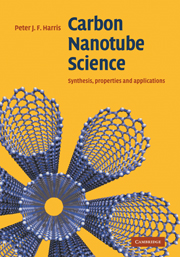Book contents
- Frontmatter
- Contents
- Preface
- 1 Introduction
- 2 Synthesis I: arc- and laser-vaporization, and heat treatment methods
- 3 Synthesis II: catalytic chemical vapour deposition and related methods
- 4 Purification and processing
- 5 Structure
- 6 Physical properties I: electronic
- 7 Physical properties II: mechanical, optical and thermal
- 8 Chemistry and biology of nanotubes
- 9 Carbon nanotube composites
- 10 Filled and heterogeneous nanotubes
- 11 Probes and sensors
- 12 Conclusions
- Name Index
- Subject Index
7 - Physical properties II: mechanical, optical and thermal
Published online by Cambridge University Press: 20 May 2010
- Frontmatter
- Contents
- Preface
- 1 Introduction
- 2 Synthesis I: arc- and laser-vaporization, and heat treatment methods
- 3 Synthesis II: catalytic chemical vapour deposition and related methods
- 4 Purification and processing
- 5 Structure
- 6 Physical properties I: electronic
- 7 Physical properties II: mechanical, optical and thermal
- 8 Chemistry and biology of nanotubes
- 9 Carbon nanotube composites
- 10 Filled and heterogeneous nanotubes
- 11 Probes and sensors
- 12 Conclusions
- Name Index
- Subject Index
Summary
The mechanical properties of carbon nanotubes have attracted just as much interest as their electronic properties, and with good reason. It is now well established that nanotubes are the stiffest and strongest fibres ever produced. Thus, the Young's modulus of the best nanotubes can be as high as 1000GPa, approximately five times higher than steel, while their tensile strength can be up to 63GPa, around 50 times higher than steel. These properties, coupled with their low density, give nanotubes huge potential in a whole range of structural applications. In many cases, exploiting these properties involves incorporating the tubes into composite materials, and this is discussed in Chapter 9. The present chapter covers the mechanical properties of carbon nanotubes in detail, beginning with a review of the theoretical predictions and then giving a summary of experimental measurements on multi- and single-walled nanotubes. Optical properties of carbon nanotubes are considered next, and the application of various forms of spectroscopy to nanotubes is described. This is followed by a brief discussion of the thermal properties of nanotubes, and finally some comments on the physical stability of nanotubes.
Mechanical properties of carbon nanotubes
Theoretical predictions
Before discussing detailed calculations of the mechanical properties of nanotubes, we can carry out some simple calculations to illustrate the relationship between the diameter of a nanotube and its stiffness. Consider first a tube with an inner diameter of 1 nm.
Information
- Type
- Chapter
- Information
- Carbon Nanotube ScienceSynthesis, Properties and Applications, pp. 179 - 203Publisher: Cambridge University PressPrint publication year: 2009
Accessibility standard: Unknown
Why this information is here
This section outlines the accessibility features of this content - including support for screen readers, full keyboard navigation and high-contrast display options. This may not be relevant for you.Accessibility Information
- 1
- Cited by
